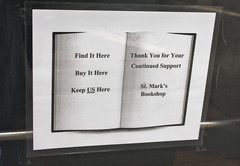Yesterday, as planned, the owners of St. Mark’s Bookshop met with officials at Cooper Union to request a rent reduction. As previously reported, the 30-year-old bookstore is in the third year of a $20,000-per-month, 10-year lease agreement with the school, an amount co-owner Terence McCoy says is unfeasible in light of the bad economy. At 4:30 p.m. yesterday, Mr. McCoy, along with partner Bob Contant, asked for a break of $5,000 per month. “It was cordial,” Mr. McCoy said of the encounter.
According to Mr. McCoy, their proposition will be taken to the school’s Executive Committee of the Board of Trustees. In the meantime the owners were instructed to gather their financial numbers for the committee.
Mr. McCoy said they went to the school with their rent concerns and financial records last year, to no avail. Now the shop is taking a different approach, proposing to their landlord that it is an East Village landmark.
Mr. McCoy said that while he doesn’t think everyone who is having trouble paying their rent should go pleading to their landlords for a break, the St. Mark’s Bookshop has a special place in the community, and the East Village would lose a vital piece of its character if the “curated” shop went under.
In the court of public opinion, at least, this new approach seems to be working. At a meeting last week, Community Board 3’s Economic Development Committee voted 9-0 to back the shop’s efforts, with City Council Member Rosie Mendez also writing a letter of support. An online petition has now gathered over 26,700 signatures.
Mr. McCoy said Cooper Union officials were “certainly aware” of the community’s voice, as well as the growing media coverage, but added that it was “hard to gauge” what they thought of it. He said he understood that the college had a financial interest as well, but felt his store was running out of options.
“The only trouble with moving is that it takes money to move,” he said.
At the time the lease with Cooper Union was signed in 2008, Mr. McCoy said the increase from $18,000 to $20,000 seemed reasonable. They expected a bump in sales from the departure of the nearby Barnes & Noble superstore, and they got it – but as the recession set in, the purse began to shrink.
Unlike his business partner, who has lamented the dawn of the e-reader and other online challenges to the hardcopy business, Mr. McCoy felt that technology had not been a leading factor in the store’s budget issues. He believed the shop fit a niche in the community and hoped Cooper Union would see the value of preserving it.
Only time, and the executive committee, will tell.




